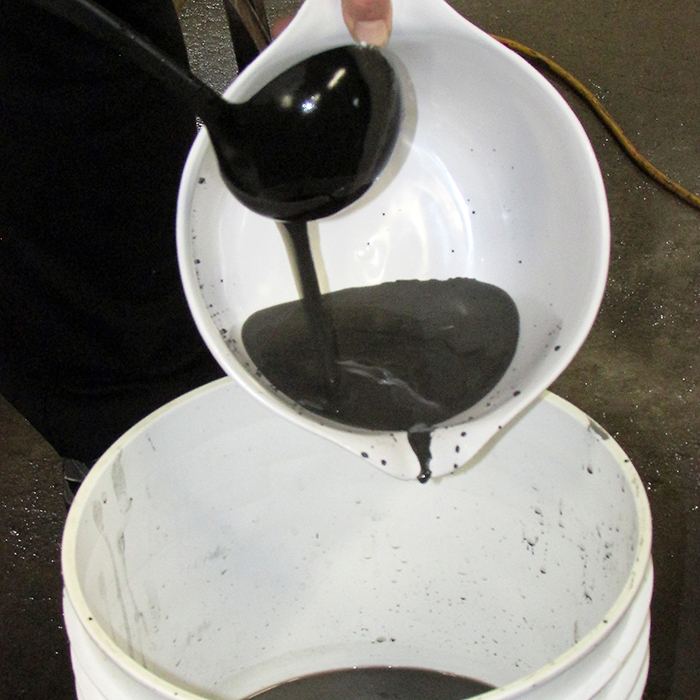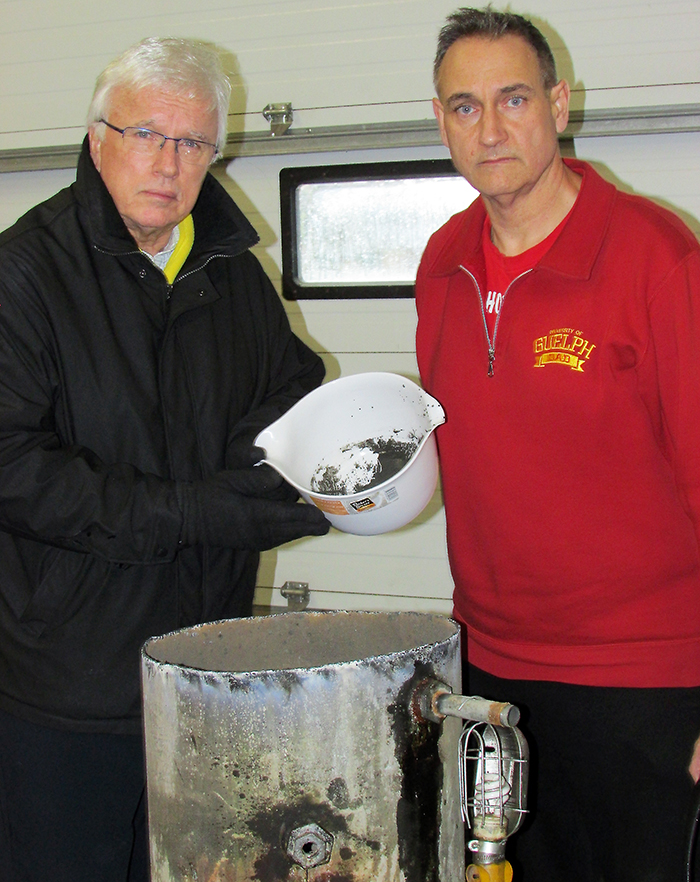
Members of Water Wells First were at the farm of Laurier Cartier in Dover this past week to see first hand the potentially toxic black sediment found in the pressure tank of the homeowner’s water well system.
According to Water Wells First (WWF) spokesperson Kevin Jakubec, water well test results from samples taken by a hydrogeologist before Christmas show heavy metals are present, and they needed a sample (at least half a cup) of the sediment for testing to determine if the heavy metals are present in the water or are carried by the Kettle Point black shale. The shale is unique to this area and runs under the aquifer supplying water to the wells in the Dover area, and is known to contain heavy metals such as lead, mercury and arsenic.
WWF maintains that vibrations caused by drilling the footings for the industrial wind turbines and the constant vibration from the turning of turbine blades cause fine particles of the shale to travel through the water aquifer to the wells.
With Cartier’s well, he said he didn’t notice a problem with his wells until the turbines surrounding his property were built, and has black water and sediment coming from his taps that his filtration system can’t keep up with.
Jakubec said his group is performing “citizen science” in getting the samples tested, something the Ministry of the Environment and Climate Change (MOECC) has not done, despite being aware of the situation with Cartier’s well since this past summer. The testing by a licenced hydrogeologist is being funded by WWF.
The concern of water with fine sediment in it that is hard to filter out is overshadowed by the concern with the long-term health effects of water contaminated with heavy metals.
“Fifty per cent of the water samples came back with Kettle Point black shale particles in them,” Jakubec said. “Our population is at risk of long-term malignancies because of the Kettle Point black shale.”
He said the group’s hydrogeologist was meeting the MOECC to show the results of the testing and the hope is that the ministry will come to Dover to test for themselves.
“The standards branch of the MOECC, last spring said they would test the well at Laurier’s and they’ve never been back. They shouldn’t ignore this,” Jakubec said. “You cannot have clean energy at the expense of our water supply.”
Area MPP Rick Nicholls, who was also at Cartier’s farm, saw the black sludge removed from the pressure tank and said he will be addressing the issue at Queen’s Park.
“We need to get the bureaucrats out of Toronto and into rural Ontario,” Nicholls said. “Never have I seen water like this and if this (sludge) is found in this pressure tank, is it reasonable to assume it is in others?”
Jakubec is asking the municipality to withhold the building permits for the new North Kent Wind Farm (NKWF) development in Chatham Township until the water issues in Dover are properly investigated. He also said the consultant company for the NKWF, AECOM, is not following proper procedure as set out by the Renewable Energy Agreement (REA) approved by the province, but is limiting the number of people on the public liaison committee to 12 and handpicking them.
The baseline testing for wells in the NKWF area that is supposed to take place before any work is done is also being rushed, Jakubec said. People were sent well surveys just before Christmas to be completed by Jan. 1, which he said did not give people a reasonable amount of time to fill out and return to AECOM. He has asked for an extension of the deadline to Feb. 1, 2017.
“We need that extension and the assurance that the project does not go forward until well baselines are properly established,” he said. “We will protest if we have to; it’s that important.”






